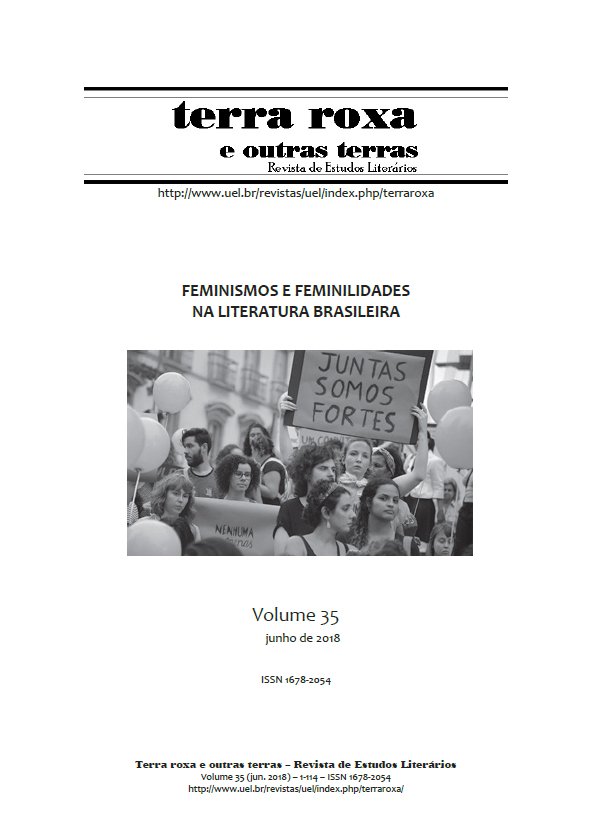Eroticism as Battle: the body in (at) poetry by women
DOI:
https://doi.org/10.5433/1678-2054.2018v35p98Keywords:
Poetry in Portuguese, Gender, Eroticisms, Comparative literatureAbstract
This article proposes a discussion on Brazilian and Portuguese poetics about the female body and the social conditions of women, produced during the decades of 1970 and 1980, through the works of authors like Maria Teresa Horta, Clarice Lispector, Ana Cristina Cesar, Luiza Neto Jorge, Adélia Prado and Olga Savary, amongst others. In a moment of social struggle against governmental and ideological repression, the emerging need for a socially disruptive speech becomes apparent (Foucault 2014), mostly one in which the female body is an active ruler and subject of the literary process, specially in erotic poetry. Through a comparative study involved with sense and presence effects of the literary pieces (Gumbrecht 2010), we bring an analysis upon the relationship between the new transgressive writings (Foucault 1963) made by women and the canon literature of the period, in agreement with Derrida's (1986) thoughts and in compliance with the feminist speech. It's noticeable that the fight for material freedom of the female body can be achieved in - and by means of - the poetic speech, in a literary movement that persists in female written poetry and prose until this day.Downloads
References
AMARAL, Helena & Felipa Mourato. O processo das três Marias: história de um julgamento. Capazes, 25 out. 2015. Disponível em: https://capazes.pt/cronicas/editorial/o-processo-das-tres-marias-historia-de-um-julgamento-por-felipa-mourato/view-all/.
BARRENO, Maria Isabel, Maria Teresa Horta & Maria Velho da Costa. Novas Cartas Portuguesas. Lisboa: Futura, 1974.
BARROSO, Carmen. Mulher, Sociedade e Estado no Brasil. UNICEF. São Paulo: Brasiliense, 1982.
BEAUVOIR, Simone de. O segundo sexo. Tradução: Sergio Millet. 2.ed. Rio de Janeiro: Nova Fronteira, 2009. 2v.
BORGES, Joana Vieira. Trajetórias e leituras feministas no Brasil e na Argentina (1960-1980). 2013. UFC, Tese (PPG em História). Disponível em: https://repositorio.ufsc.br/handle/123456789/107433
CAMÕES, Luís Vaz de. Os Lusíadas. Porto: Porto, 1982.
CESAR, Ana Cristina. Poética. São Paulo: Companhia das Letras, 2013.
CESAR, Ana Cristina. Escritos no Rio. Rio de Janeiro: UFRJ, 1993.
CIXOUS, Hélène. O riso da Medusa (1975). Izabel Brandão (org). Traduções da Cultura: Perspectivas críticas feministas (1970-2010). Florianópolis: EDUFAL, 2017. p. 129-155.
DERRIDA, Jacques. Parages. Paris: Galilée, 1986.
FOUCAULT, Michel. Estética: Literatura e Pintura, Música e Cinema. Trad. Inês Autran Dourado Barbosa. . Rio de Janeiro: Forense Universitária, 2009.
FOUCAULT, Michel. Microfísica do Poder. Rio de Janeiro: Paz e Terra, 2014.
FOUCAULT, Michel. Vigiar e punir: nascimento da prisão. Trad. Raquel Ramalhete. Petrópolis: Vozes, 1987.
GOTLIB, Nádia Battella. A literatura feita por mulheres no Brasil. Oxford: University of Oxford, 2001.
GUMBRECHT, Hans Ulrich. Produção de presença: o que o sentido não consegue transmitir. Trad. Ana Isabel Soares. Rio de Janeiro: Contraponto, 2010.
HANISCH, Carol. The Personal is Political (1969). Disponível em: http://carolhanisch.org/CHwritings/PIP.html.
HILST, Hilda. da morte. odes mínimas. São Paulo: Massao Ohno/Roswitha Kempf, 1980.
HANISCH, Carol. Fluxo-Floema. São Paulo: Perspectiva, 1970.
HORTA, Maria Teresa. Educação Sentimental. Lisboa: A Comuna, 1976.
INÁCIO, Emerson da Cruz. Do corpo o canto, perfumada presença: o corpo, Fluxo-Floema e Novas Cartas Portuguesas. USP 2016. Tese (Livre-Docência).
JORGE, Luiza Neto. Os sítios sitiados. Lisboa: Plátano, 1973.
LISPECTOR, Clarice. A hora da estrela. Rio de Janeiro: Rocco, 1998.
PRADO, Adélia. Terra de Santa Cruz. Rio de Janeiro: Nova Fronteira, 1981.
RAMALHO, Maria Irene. Os estudos sobre as mulheres e o saber: donde se conclui que o poético é feminista. EX AEQUO, n. 5, 2001, pp. 107-122.
RÃœSCHE, Ana. o corpo é um corpo. Blog: ana rüsche l escritora (São Paulo), 2014. Disponível em: http://wordpress.anarusche.com/o-corpo-e-um-corpo/.
SAVARY, Olga. Magma. São Paulo: Massao Ohno/Roswitha Kempf (coedição),1982.
RÃœSCHE, Ana. Repertório selvagem - Obra reunida - 12 livros de poesia. Rio de Janeiro: Multimais, 1998.
SOUZA, Sandra Maria Nascimento. Mulheres em movimento: memória da participação das mulheres nos movimentos pelas transformações nas relações de gênero dos anos 1970 a 1980. São Luís: EDUFMA, 2007.
Downloads
Published
How to Cite
Issue
Section
License
Copyright (c) 2019 Terra Roxa e Outras Terras: Revista de Estudos Literários

This work is licensed under a Creative Commons Attribution 4.0 International License.
Authors who publish in this journal agree to the following terms:
a) The authors retain the copyright and grant the journal the right of first publication, the work being simultaneously licensed under the Creative Commons Attribution-NonCommercial 4.0 International License, allowing the sharing of the work with acknowledgment of the authorship of the work and initial publication in this journal.
b) Authors are authorized to assume additional contracts separately, for non-exclusive distribution of the version of the work published in this journal (eg, publish in an institutional repository or as a book chapter), with acknowledgment of authorship and initial publication in this journal.
c) Authors are allowed and encouraged to publish and distribute their work online (e.g. in institutional repositories or on their personal page) after the editorial process, as this can generate productive changes as well as increase impact and citation of the published work (See The Effect of Open Access).
d) The authors of the approved works authorize the journal to, after publication, transfer their content for reproduction in content indexers, virtual libraries and the like.
e) The authors assume that the texts submitted for publication are of their original creation, taking full responsibility for their content in case of any objection by third parties.



















